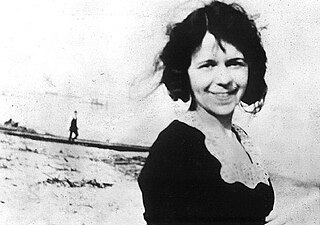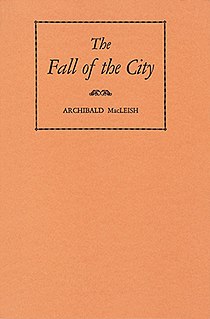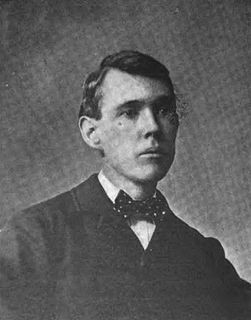
The Planets: A Modern Allegory is a radio play, written in verse, by Alfred Kreymborg. The first performance was on 6 June 1938 by the National Broadcasting Company at the Hayden Planetarium in New York City, and was directed by Thomas L. Riley. The play was originally set to the music of The Planets Suite by Gustav Holst; for the first performance the NBC Symphony Orchestra was conducted by H. Leopold Spitalny. The first broadcast was so enthusiastically received that it was repeated a few weeks later.

Alfred Francis Kreymborg was an American poet, novelist, playwright, literary editor and anthologist.

The National Broadcasting Company (NBC) is an American English-language commercial terrestrial radio and television networks that is a flagship property of NBCUniversal, a subsidiary of Comcast. The network is headquartered at 30 Rockefeller Plaza in New York City, with additional major offices near Los Angeles, Chicago and Philadelphia. The network is one of the Big Three television networks. NBC is sometimes referred to as the "Peacock Network", in reference to its stylized peacock logo, introduced in 1956 to promote the company's innovations in early color broadcasting. It became the network's official emblem in 1979.

The City of New York, usually called either New York City (NYC) or simply New York (NY), is the most populous city in the United States. With an estimated 2018 population of 8,398,748 distributed over a land area of about 302.6 square miles (784 km2), New York is also the most densely populated major city in the United States. Located at the southern tip of the state of New York, the city is the center of the New York metropolitan area, the largest metropolitan area in the world by urban landmass and one of the world's most populous megacities, with an estimated 19,979,477 people in its 2018 Metropolitan Statistical Area and 22,679,948 residents in its Combined Statistical Area. A global power city, New York City has been described as the cultural, financial, and media capital of the world, and exerts a significant impact upon commerce, entertainment, research, technology, education, politics, tourism, art, fashion, and sports. The city's fast pace has inspired the term New York minute. Home to the headquarters of the United Nations, New York is an important center for international diplomacy.
Contents
The play describes the early history of the twentieth century, including the onset of World War I, and the 'hysterical' 1920s, ending with a mix of dread and uncertainty about the future. The book of the play is dedicated 'to peace'; it was published by Farrar & Rinehart, New York, in 1938. The central figure of the play is the Astrologer, who encounters the various planets in turn, as the events of world history are alluded to in a somewhat prophetic tone.

World War I, also known as the First World War, the Great War, the Seminal Catastrophe, and initially in North America as the European War, was a global war originating in Europe that lasted from 28 July 1914 to 11 November 1918. Contemporaneously described as "the war to end all wars", it led to the mobilisation of more than 70 million military personnel, including 60 million Europeans, making it one of the largest wars in history. It is also one of the deadliest conflicts in history, with an estimated nine million combatants and seven million civilian deaths as a direct result of the war, while resulting genocides and the resulting 1918 influenza pandemic caused another 50 to 100 million deaths worldwide.
Farrar & Rinehart (1929–1946) was a United States book publishing company founded in New York. Farrar & Rinehart enjoyed success with both nonfiction and novels, notably, the landmark Rivers of America Series and the first ten books in the Nero Wolfe corpus of Rex Stout. In 1943 the company was recognized with the first Carey-Thomas Award for creative publishing presented by Publishers Weekly.







